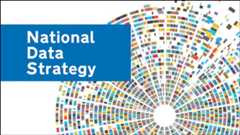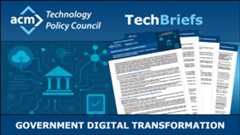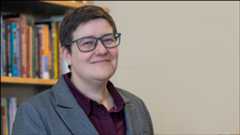Public PolicyGlobal Policy and Public Affairs
ACM provides independent, nonpartisan, and technology-neutral research and resources to policy leaders, stakeholders, and the public about public policy issues, drawn from the deep technical expertise of the computing community.
Technology is at the heart of some of the most pressing issues faced by society. Developed and deployed around the globe, new technologies – and our increasing reliance on computing and networks – raise concerns that stretch beyond national borders, going to the heart of how we live, work, and interact with one another.
Drawing on a membership that includes industry pioneers and leading researchers at the forefront of technology, ACM provides expertise and advice to policymakers, the media, and the public.
[Learn More about ACM's Public Policy Expertise...]
Agentic AI — the new paradigm for creating autonomous systems capable of perceiving, reasoning, learning, and acting towards goals using large language models (LLMs) with minimal human oversight — offers transformative potential but also poses systemic risks that the EU AI Act only partially addresses. This policy brief from the Europe Technology Policy Committee identifies potential gaps in the current regulatory framework and recommends opportunities to make oversight continuous and dynamic.

ACM's US Technology Policy Committee has released a “Statement on Mass Cybersecurity Incidents Likely to Recur.” On July 18, 2024, CrowdStrike, a US-based cybersecurity technology company, released a sensor configuration update which caused a global outage affecting an estimated 8.5 million computers. Several critical infrastructure sectors including airlines, 911 emergency systems, banks, government agencies, healthcare, and hospitals around the world were impacted. ACM USTPC urges that all the details be thoroughly and publicly investigated.

In response to major advances in generative AI technologies—as well as the significant questions these technologies pose in areas including intellectual property, the future of work, and even human safety—ACM's global Technology Policy Council (TPC) has issued "Principles for the Development, Deployment, and Use of Generative AI Technologies." Drawing on the deep technical expertise of computer scientists in the United States and Europe, the TPC statement outlines eight principles intended to foster fair, accurate, and beneficial decision-making concerning generative and all other AI technologies.

The Association for Computing Machinery’s global Technology Policy Council (TPC) has released a new Statement on Principles for Responsible Algorithmic Systems authored jointly by its US (USTPC) and Europe Technology Policy Committees (Europe TPC). Recognizing that algorithmic systems are increasingly used by governments and companies to make or recommend decisions that have far-reaching effects on individuals, organizations, and society, the ACM Statement lays out nine instrumental principles intended to foster fair, accurate, and beneficial algorithmic decision-making.

ACM's US Technology Policy Committee has released aStatement on Principles for the Development and Deployment of Equitable, Private, and Secure Remote Proctoring Systems. The statement provides a framework to guide those developing and deploying remote proctoring systems to ensure that these systems are private, secure, fair, and accessible for all users. The statement refines and expands upon principles first developed and published in August of 2021 as the COVID pandemic increased the use of, but not necessarily the adoption of, adequate policies and practices to govern such systems.

ACM's US Technology Policy Committee joined with theInformation Technology & Innovation Foundation and theOnline News Association to bring together key stakeholders, experts, and thought leaders to discuss the future of deepfakes, disinformation, and democracy in a half-day virtual policy conference.View a recording of the conference, which occurred on Wednesday, June 2.
ACM's Technology Policy Council and Diversity, Equity, and Inclusion Council sponsored a free screening and public discussion of the film "Coded Bias" and how those in computer science fields can address issues of algorithmic fairness. The discussion, held on March 29, 2021, has beenarchived, and "Coded Bias" is now viewable on bothPBS andNetflix.
ACM Fellow Timothy Pinkston organized and moderated a panel on"Valuing Diversity, Equity, and Inclusion in Our Computing Community," held as a joint session of several co-located virtual conferences in March 2021. The panel included John Hennessey, David Patterson, Natalie Enright Jerger, Margaret Martonosi, Bill Dally and Kim Hazelwood.Watch a recording of the session andread a recap inCACM.
ACM’s Europe Technology Policy Committee submitted comments to the European Commission on "Artificial Intelligence—A European approach to excellence and trust," which addresses the future of AI in Europe. The comments, submitted in questionnaire form, asked the Commission to rate priorities based on their perceived importance, such as skills and training; public/private partnerships; and financing for startups.

ACM’s Europe Technology Policy Committee has formally urged the UK government to assure that its National Data Strategy provide for datasets that are open, subject to multidisciplinary expert review, protected by robust risk assessment, and compiled in consultation with marginalized communities to assure their benefit to all sectors of society.

ACM's US Technology Policy Committee filed afriend of the court brief with the US Supreme Court in the landmark case ofVan Buren v. United States—the first time it has reviewed the Computer Fraud and Abuse Act, a 1986 law that was originally intended to punish hacking. USTPC notes that the questions posed in this case have broad implications for data and computing scientists, as well as other professionals who use the internet and computing technology, particularly to access information posted online.

ACM's US Technology Policy Committee has called for “an immediate suspension of the current and future private and governmental use of facial recognition (FR) technologies in all circumstances known or reasonably foreseeable to be prejudicial to established human and legal rights” in its “Statement on Principles and Prerequisites for the Development, Evaluation and Use of Unbiased Facial Recognition Technologies.”

ACM’s Europe Technology Policy Committee issued detailed principles and practices for the development and deployment of contact tracing technology intended to track and arrest the spread of COVID-19. The statement calls on governments that adopt such systems to choose "only those which... respect and protect the rights of all individuals; safeguard personal data and privacy to the highest degree technically possible; and are subject to scrutiny by the scientific community and civil society before, during and after deployment."Read the statement in Italian here and inFrench here.

ACM’s Europe Technology Policy Committee submitted comments to the Directorate General for Climate Action of the European Commission in support of the comprehensive and ambitious sweep of the Commission’s Green Deal. ACM Europe TPC strongly concurs with the Commission’s premise that realizing true energy efficiencies in the information and communication technology (ICT) sector will be critical to Europe’s success in meeting the Green Deal’s appropriately aggressive climate targets.

ACM's US Technology Policy Committee (USTPC) has released a Statement on Security and Privacy Principles for Virtual Meetings in light of changes necessitated by the COVID-19 pandemic. The Statement urges urges virtual conferencing platform designers, hosts, and users to adopt eight key security and privacy principles that are intended to greatly heighten the privacy and security not only of conference participants, but also of any transmitted or stored data.

ACM’s US Technology Policy Committee (USTPC) joined many of the nation’s leading experts in cybersecurity, computing, and science in calling on all governors and state election directors to refrain from using any form of internet voting or voting app system in the 2020 elections. Thejoint open letter includes a detailed analysis prepared by the AAAS Center for Scientific Evidence in Public Issues which clearly demonstrates that internet voting is not a secure solution for voting in the US.

Virginia Dignum and Jeanna Matthews have been appointed Co-Chairs of ACM's Technology Policy Council, which addresses global technology policy. Dignum is a Professor of Computing Science / Responsible Artificial Intelligence and the Director of the AI Policy Lab at Umeå University, Sweden. Matthews is a Professor in the Department of Computer Science, Coulter School of Engineering & Applied Sciences at Clarkson University.

ACM TechBriefs is a series of short technical bulletins by ACM’s Technology Policy Council that present scientifically-grounded perspectives on the impact of specific developments or applications of technology. Designed to complement ACM’s activities in the policy arena, the primary goal is to inform rather than advocate for specific policies. The new edition states that governments throughout the world urgently need to complete the digital transformation that started with the adoption of the World Wide Web in the 1990s and early 2000s to deliver services.

Once considered science fiction, autonomous weapons systems long ago left the drawing board for the battlefield. Employed in conflicts today, such systems remain controversial and are ungoverned by any broad binding international agreement. The ACM US Technology Policy Committee hosted the HotTopics webinar: "Death by Algorithm: The Use, Control, and Legality of Lethal and Other Autonomous Weapons Systems" with Larry Medsker (Moderator), Ronald C. Arkin, Gary Corn, Jack Shanahan, and Jody Westby discussing this timely and critical subject.
ACM has named Tom Romanoff as its new Policy Director to coordinate and support ACM's engagement on technology policy issues globally. Most recently, Romanoff served as Director of the Technology Project at the Bipartisan Policy Center, where he worked on issues including AI, data privacy, cybersecurity, augmented reality, competition in the tech sector, cloud computing, space technologies, and online content moderation. Before his work with the US government, he helped the United Nations Development Program modernize its global data collection and analytics system.

The ACM Europe Technology Policy Committee promotes dialogue and the exchange of ideas on technology and computing policy issues with the European Commission, governmental bodies in Europe, and the informatics and computing communities. Chaired by Michel Beaudouin-Lafon of Université Paris-Saclay, the Committee engages in policy issues related to the importance of technology in boosting jobs, economic growth, competition, investment, research and development, education, inclusive social development, and innovation.

Sorelle Friedler has been named Chair of the ACM US Technology Policy Committee effective August 25, 2025. USTPC serves as the focal point for ACM's interaction with US government organizations, the computing community, and the US public in all matters of US public policy related to information technology. Friedler is the Shibulal Family Professor of Computer Science at Haverford College and a Nonresident Senior Fellow at The Brookings Institution. She served as the Assistant Director for Data and Democracy in the White House Office of Science and Technology Policy under the Biden-Harris Administration.

US Digital Response is a volunteer-run, non-partisan effort to help federal, state, and local government with technology, data, design, operations, communications, project management, and more during the COVID-19 crisis. This initiative is calling for data scientists, front-end/back-end engineers, designers, engineering managers, product managers, user researchers, and others to lend their skills and expertise to the fight against COVID-19.

View a recording of a US Technology Policy Committee (USTPC) panel discussion on Section 230 of the Communications Decency Act. Panelists included:
Andy Grosso, Chair of USTPC’s Law Subcommittee and former Assistant US Attorney, moderated. The panel, "Section 230: The Origins and Future of Online Content Control and Liability in the US," took place on November 18, 2020 via Zoom and was free and open to all.